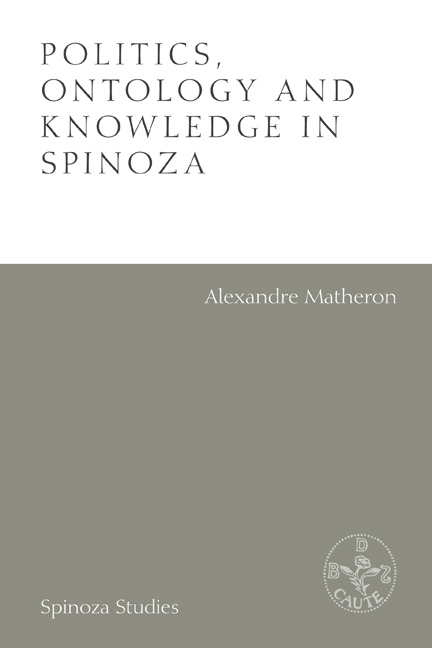Book contents
- Frontmatter
- Contents
- Abbreviations
- Notes on Translation and Acknowledgements
- A Revolutionary Beatitude: Alexandre Matheron’s Spinozism
- I Spinoza on Ontology and Knowledge
- 1 Idea, Idea of the Idea and Certainty in the Tractatus de Intellectus Emendatione and the Ethics
- 2 Essence, Existence and Power in Part I of the Ethics: The Foundations of Proposition 16
- 3 Physics and Ontology in Spinoza: The Enigmatic Response to Tschirnhaus
- 4 The Year 1663 and the Spinozist Identity of Being and Power: Hypothesis on a Development
- 5 Eternal Life and the Body According to Spinoza
- 6 Intellectual Love of God, Eternal Part of the amor erga Deum
- II Spinoza on Politics and Ethics
- 7 State and Morality According to Spinoza
- 8 Ethics and Politics in Spinoza (Remarks on the Role of Ethics IV, 37 Scholium 2)
- 9 Indignation and the Conatus of the Spinozist State
- 10 Passions and Institutions According to Spinoza
- 11 The Problem of Spinoza's Evolution: From the Theologico-Political Treatise to the Political Treatise
- 12 Is the State, According to Spinoza, an Individual in Spinoza’s Sense?
- 13 The Ontological Status of Scripture and the Spinozist Doctrine of Individuality
- 14 Spinoza and Power
- 15 Spinoza and Property
- 16 Spinoza and Sexuality
- 17 Women and Servants in Spinozist Democracy
- 18 The ‘Right of the Stronger’: Hobbes contra Spinoza
- 19 The Theoretical Function of Democracy in Spinoza and Hobbes
- 20 Spinoza and the Breakdown of Thomist Politics: Machiavellianism and Utopia
- Appendix 1 Interview with Laurent Bove and Pierre-François Moreau
- Appendix 2 Chronology of Works by Matheron
- Works Cited
- Index
8 - Ethics and Politics in Spinoza (Remarks on the Role of Ethics IV, 37 Scholium 2)
Published online by Cambridge University Press: 03 October 2020
- Frontmatter
- Contents
- Abbreviations
- Notes on Translation and Acknowledgements
- A Revolutionary Beatitude: Alexandre Matheron’s Spinozism
- I Spinoza on Ontology and Knowledge
- 1 Idea, Idea of the Idea and Certainty in the Tractatus de Intellectus Emendatione and the Ethics
- 2 Essence, Existence and Power in Part I of the Ethics: The Foundations of Proposition 16
- 3 Physics and Ontology in Spinoza: The Enigmatic Response to Tschirnhaus
- 4 The Year 1663 and the Spinozist Identity of Being and Power: Hypothesis on a Development
- 5 Eternal Life and the Body According to Spinoza
- 6 Intellectual Love of God, Eternal Part of the amor erga Deum
- II Spinoza on Politics and Ethics
- 7 State and Morality According to Spinoza
- 8 Ethics and Politics in Spinoza (Remarks on the Role of Ethics IV, 37 Scholium 2)
- 9 Indignation and the Conatus of the Spinozist State
- 10 Passions and Institutions According to Spinoza
- 11 The Problem of Spinoza's Evolution: From the Theologico-Political Treatise to the Political Treatise
- 12 Is the State, According to Spinoza, an Individual in Spinoza’s Sense?
- 13 The Ontological Status of Scripture and the Spinozist Doctrine of Individuality
- 14 Spinoza and Power
- 15 Spinoza and Property
- 16 Spinoza and Sexuality
- 17 Women and Servants in Spinozist Democracy
- 18 The ‘Right of the Stronger’: Hobbes contra Spinoza
- 19 The Theoretical Function of Democracy in Spinoza and Hobbes
- 20 Spinoza and the Breakdown of Thomist Politics: Machiavellianism and Utopia
- Appendix 1 Interview with Laurent Bove and Pierre-François Moreau
- Appendix 2 Chronology of Works by Matheron
- Works Cited
- Index
Summary
As early as the Treatise on the Emendation of the Intellect, it was clear that the philosopher, according to Spinoza, would necessarily end up being concerned with politics. In Paragraph 14 of that work, in fact, having just claimed to have conceived, as an ideal model, a perfect human nature – perfect, that is, as powerful as possible – consisting in the ‘union that the mind has with the whole of Nature’, Spinoza immediately added: the end that I pursue is ‘to acquire such a nature, and to strive that many acquire it with me. That is, it is part of my happiness to take pains that many others may understand as I understand.’ From which he concludes, a little farther on: for that, it is necessary ‘to form a society of the kind that is desirable, so that as many as possible may attain it as easily and surely as possible’.
To be sure, if we take this text in isolation, it doesn't yet prove that politics is at issue. But now let us consider what he had said earlier, throughout the first eleven paragraphs of the same treatise, concerning pleasures, honours and riches. These external goods, having previously appeared to Spinoza in succession first as certain goods, then as uncertain goods and then as certain evils, acquire their definitive status in Paragraph 11: these are conditional goods, which are only evil for us if they are pursued for themselves, but which, insofar as they are mere means, can contribute greatly to the acquisition of the true good. Now, if we connect this passage to the preceding one, the implication is clear; for if one wants the same end for everyone, one also wants the same means for everyone. Therefore what Spinoza implicitly wants is the formation of a society in which the greatest possible number of people could peacefully enjoy the pleasures of the senses (without being disturbed by this or that religious authority), where the greatest possible number of people live in economic comfort (which implies at least that the regime of property must not be too inegalitarian), and where honours would be spread among the greatest possible number of people (which implies at least a certain degree of democratisation of political institutions).
- Type
- Chapter
- Information
- Politics, Ontology and Knowledge in Spinoza , pp. 114 - 123Publisher: Edinburgh University PressPrint publication year: 2020



